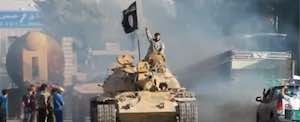By Dan Calabrese ——Bio and Archives--May 26, 2015
American Politics, News | CFP Comments | Reader Friendly | Subscribe | Email Us
 You'd think it would represent a major blow to ISIS if you could take out its headquarters - and apparently U.S. forces know exactly where ISIS headquarters is located. Specifically we're talking about seven buildings in Raqqa, Syria. Furthermore, you'd think that if you had a shot at thousands of ISIS terrorists - the very ones who just took Ramadi and were running around in the open flaunting it - you'd take them out.
You'd think it would represent a major blow to ISIS if you could take out its headquarters - and apparently U.S. forces know exactly where ISIS headquarters is located. Specifically we're talking about seven buildings in Raqqa, Syria. Furthermore, you'd think that if you had a shot at thousands of ISIS terrorists - the very ones who just took Ramadi and were running around in the open flaunting it - you'd take them out.American and allied warplanes are equipped with the most precise aerial arsenal ever fielded. But American officials say they are not striking significant — and obvious — Islamic State targets out of fear that the attacks will accidentally kill civilians. Killing such innocents could hand the militants a major propaganda coup and alienate both the local Sunni tribesmen, whose support is critical to ousting the militants, and Sunni Arab countries that are part of the American-led coalition. But many Iraqi commanders, and even some American officers, argue that exercising such prudence is harming the coalition’s larger effort to destroy the Islamic State, also known as ISIS or Daesh, and that it illustrates the limitations of American air power in the Obama administration’s strategy. A persistent complaint of Iraqi officials and security officers is that the United States has been too cautious in its air campaign, frequently allowing columns of Islamic State fighters essentially free movement on the battlefield. “The international alliance is not providing enough support compared with ISIS’ capabilities on the ground in Anbar,” said Maj. Muhammed al-Dulaimi, an Iraqi officer in Anbar Province, which contains Ramadi. “The U.S. airstrikes in Anbar didn’t enable our security forces to resist and confront the ISIS attacks,” he added. “We lost large territories in Anbar because of the inefficiency of the U.S.-led coalition airstrikes.” It appears that Islamic State troops are taking advantage of restrictions on how the coalition carries out its bombing campaign, with militants increasingly fighting from within civilian populations to deter attack.
View Comments
Dan Calabrese’s column is distributed by HermanCain.com, which can be found at HermanCain
Follow all of Dan’s work, including his series of Christian spiritual warfare novels, by liking his page on Facebook.